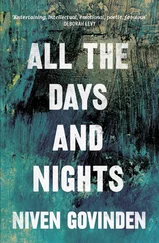Charles Kingsley - All Saints' Day and Other Sermons
Здесь есть возможность читать онлайн «Charles Kingsley - All Saints' Day and Other Sermons» — ознакомительный отрывок электронной книги совершенно бесплатно, а после прочтения отрывка купить полную версию. В некоторых случаях можно слушать аудио, скачать через торрент в формате fb2 и присутствует краткое содержание. Издательство: Иностранный паблик, Жанр: foreign_prose, foreign_religion, Философия, foreign_psychology, foreign_antique, на английском языке. Описание произведения, (предисловие) а так же отзывы посетителей доступны на портале библиотеки ЛибКат.
- Название:All Saints' Day and Other Sermons
- Автор:
- Издательство:Иностранный паблик
- Жанр:
- Год:неизвестен
- ISBN:нет данных
- Рейтинг книги:4 / 5. Голосов: 1
-
Избранное:Добавить в избранное
- Отзывы:
-
Ваша оценка:
- 80
- 1
- 2
- 3
- 4
- 5
All Saints' Day and Other Sermons: краткое содержание, описание и аннотация
Предлагаем к чтению аннотацию, описание, краткое содержание или предисловие (зависит от того, что написал сам автор книги «All Saints' Day and Other Sermons»). Если вы не нашли необходимую информацию о книге — напишите в комментариях, мы постараемся отыскать её.
All Saints' Day and Other Sermons — читать онлайн ознакомительный отрывок
Ниже представлен текст книги, разбитый по страницам. Система сохранения места последней прочитанной страницы, позволяет с удобством читать онлайн бесплатно книгу «All Saints' Day and Other Sermons», без необходимости каждый раз заново искать на чём Вы остановились. Поставьте закладку, и сможете в любой момент перейти на страницу, на которой закончили чтение.
Интервал:
Закладка:
I shall not give now the reasons which have led me, and not in haste, to this melancholy conclusion. I shall only say that I have come to it, with pain, and shame, and fear. With shame and fear. For when I ask you the solemn question, Would you know Christ if He came among you? do I not ask myself a question which I dare not answer? How can I tell whether I should recognise, after all, my Saviour and my Lord? How do I know that if He said (as He but too certainly might), something which clashed seriously with my preconceived notions of what He ought to say, I should not be offended, and walk no more with Him? How do I know that if He said, as in Judea of old, “Will ye too go away?” I should answer with St Peter, “Lord, to whom shall we go? Thou hast the words of eternal life, and we believe and are sure that thou art the Christ, the Son of the living God?” I dare not ask that question of myself. How then dare I ask it of you? I know not. I can only say, “Lord, I believe: help thou mine unbelief.” I know not. But this I know—that in this or any other world, if you or I did recognise Him, it would be with utter shame and terror, unless we had studied and had striven to copy either Himself, or whatsoever seems to us most like Him. Yes; to study the good, the beautiful, and the true in Him, and wheresoever else we find it—for all that is good, beautiful, and true throughout the universe are nought but rays from Him, the central sun—to obey St. Paul of old, and “whatsoever things are true, venerable, just, pure, lovely, and of good report—if there be any virtue and if there be any praise, to think on these things,”—on these scattered fragmentary sacraments of Him whose number is not two, nor seven, “but seventy-times seven;” that is the way—I think, the only way—to be ready to recognise our Saviour, and to prepare to meet our God; that He may be to us, too, as a refiner’s fire, and refine us—our thoughts, our deeds, our characters throughout.
And I think, too, that this is the way, perhaps the only way, to rid ourselves of the fancy that we can be accounted righteous before God for any works or deservings of our own. Those in whom that fancy lingers must have but a paltry standard of what righteousness is, a mean conception of moral—that is, spiritual—perfection. But those who look not inwards, but upwards; not at themselves, but at Christ and all spiritual perfection—they become more and more painfully aware of their own imperfections. The beauty of Christ’s character shows them the ugliness of their own. His purity shows them their own foulness. His love their own hardness. His wisdom their own folly. His strength their own weakness. The higher their standard rises, the lower falls their estimate of themselves; till, in utter humiliation and self-distrust, they seek comfort ere alone it can be found—in faith —in utter faith and trust in that very moral perfection of Christ which shames and dazzles them, and yet is their only hope. To trust in Him for themselves and all they love. To trust that, just because Christ is so magnificent, He will pity, and not despise, our meanness. Just because He is so pure, and righteous, and true, and lovely, He will appreciate, and not abhor, our struggles after purity, righteousness, truth, love, however imperfect, however soiled with failure—and with worse. Just because He is so unlike us, He will smile graciously upon out feeblest attempts to be like Him. Just because He has borne the sins and carried the sorrows of mankind, therefore those who come to Him He will in no wise cast out. Amen.
SERMON V. ADVENT LESSONS
Westminster Abbey, First Sunday in Advent , 1873.
Romans vii. 22-25. “I delight in the law of God after the inward man: but I see another law in my members, warring against the law of my mind, and bringing me into captivity to the law of sin which is in my members. O wretched man that I am! who shall deliver me from the body of this death? I thank God through Jesus Christ our Lord.”
This is the first Sunday in Advent. To-day we have prayed that God would give us grace to put away the works of darkness, and put on us the armour of light. Next Sunday we shall pray that, by true understanding of the Scriptures, we may embrace and hold fast the blessed hope of everlasting life. The Sunday after that the ministers and stewards of God’s mysteries may prepare His way by turning the hearts of the disobedient to the wisdom of the just—the next, that His grace and mercy may speedily help and deliver us from the sins which hinder us in running the race set before us. But I do not think that we shall understand those collects, or indeed the meaning of Advent itself, or the reason why we keep the season of Advent year by year, unless we first understand the prayer which we offered up last Sunday, “Stir up, O Lord, the wills of Thy faithful people,”—and we shall understand that prayer just in proportion as we have in us the Spirit of God, or the spirit of the world, which is the spirit of unbelief.
Worldly people say—and say openly, just now—that this prayer is all a dream. They say God will not stir up men’s wills to do good any more than to do harm. He leaves men to themselves to get through life as they can. This Heavenly Father of whom you speak will not give His holy spirit to those who ask Him. He does not, as one of your Collects says, put into men’s minds good desires—they come to a man entirely from outside a man, from his early teaching, his youthful impressions, as they are called now-a-days. He does not either give men grace and power to put these desires into practice. That depends entirely on the natural strength of a man’s character; and that, again, depends principally on the state of his brain. So, says the world, if you wish your own character to improve, you must improve it yourself, for God will not improve it for you. But, after all, why should you try to improve? why not be content to be just what you are? you did not make yourself, and you are not responsible for being merely what God has chosen to make you.
This is what worldly men say, or at least what they believe and act on; and this is the reason why there is so little improvement in the world, because men do not ask God to improve their hearts and stir up their wills. I say, very little improvement. Men talk loudly of the enlightenment of the age, and the progress of the species, and the spread of civilisation, and so forth: but when I read old books, and compare old times with these, I confess I do not see so much of it as all this hopeful talk would lead me to expect. Men in general have grown more prudent, more cunning, from long experience. They have found out that certain sins do not pay—that is, they interfere with people’s comfort and their power of making money, and therefore they prudently avoid them themselves, and put them down by law in other men’s cases. Men have certainly grown more good-natured, in some countries, in that they dislike more than their ancestors did, to inflict bodily torture on human beings; but they are just as ready, or even more ready, to inflict on those whom they dislike that moral and mental torture which to noble souls is worse than any bodily pain. As for any real improvement in human nature—where is it? There is just as much falsehood, cheating, and covetousness, I believe, in the world as ever there was; just as much cant and hypocrisy, and perhaps more; just as much envy, hatred, malice and all uncharitableness. Is not the condition of the masses in many great cities as degraded and as sad as ever was that of the serfs in the middle ages? Do not the poor still die by tens of thousands of fevers, choleras, and other diseases, which we know perfectly how to prevent, and yet have not the will to prevent? Is not the adulteration of food just now as scandalous as it is unchecked? The sins and follies of human nature have been repressed in one direction only to break out another. And as for open and coarse sin, people complain even now, and I fear with justice, that there is more drunkenness in England at this moment than there ever was. So much for our boasted improvement.
Читать дальшеИнтервал:
Закладка:
Похожие книги на «All Saints' Day and Other Sermons»
Представляем Вашему вниманию похожие книги на «All Saints' Day and Other Sermons» списком для выбора. Мы отобрали схожую по названию и смыслу литературу в надежде предоставить читателям больше вариантов отыскать новые, интересные, ещё непрочитанные произведения.
Обсуждение, отзывы о книге «All Saints' Day and Other Sermons» и просто собственные мнения читателей. Оставьте ваши комментарии, напишите, что Вы думаете о произведении, его смысле или главных героях. Укажите что конкретно понравилось, а что нет, и почему Вы так считаете.












